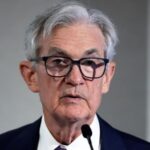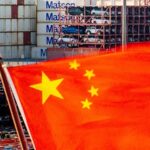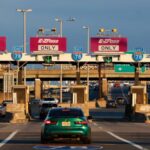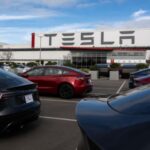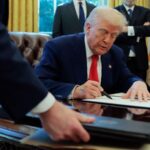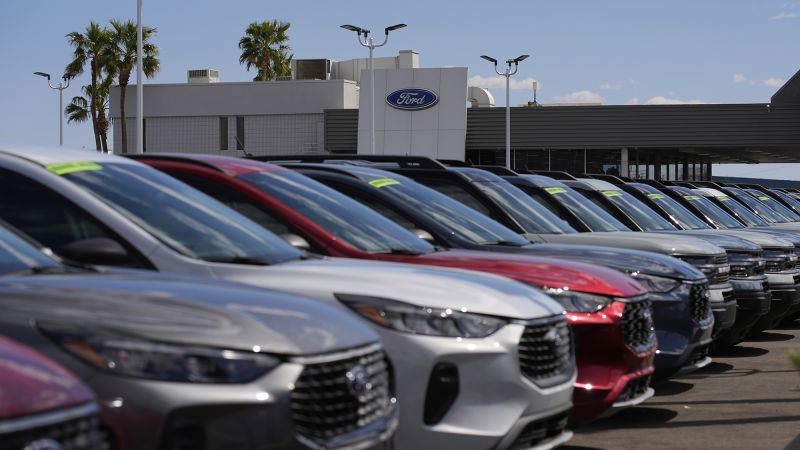
CNN
—
Ford is warning its dealers that tariffs will likely raise prices in the coming months, the latest impact the import taxes will have on Americans’ finances.
President Donald Trump’s 25% tariffs on all imported cars went into effect April 3. In a memo to Ford dealers first reported by Automotive News, the automaker told dealers that the cost of those tariffs could be passed down on some vehicle deliveries starting in June since “certain tariffs are likely to remain in place for at least some time.”
“We will not increase the MSRP (manufacturer’s suggested retail price) for any vehicle currently in inventory with our Ford and Lincoln dealers,” Andrew Frick, president of the Ford unit overseeing retail sales, said in the memo. “However, in the absence of material changes to the tariff policy as articulated to date, we anticipate the need to make vehicle pricing adjustments in the future, which is expected to happen with May production.”
Ford confirmed the memo’s accuracy to CNN, adding that it is not expecting any imminent change in retail prices at its dealerships.That’s becausecars produced in May would not arrive at dealerships until June or later.
“Customers will have a lot of choices, and we have plenty of inventory to choose from through June 2,” Ford said in a statement. “The tariff situation is dynamic and we continue to evaluate the potential impact of tariff actions.”
Automakers, dealers and American car buyers have been bracing for the impact of tariffs, which could upend the market for car purchases in the coming weeks. Experts says the 25% tariff could raise the cost to build or import cars by thousands of dollars each, as well as reducing the supply of vehicles available for sale. And with the administration also planning to put tariffs on auto parts as soon as next month, that could raise the price of cars even higher since all vehicles built the US contain some imported parts.
To help assure customers, Ford previously announced an “employee pricing” discount offer for buyers on most of its vehicles April 3, the day that tariffs on imported cars took effect. But the memo from Ford to its dealer network is a sign of that it could soon be unavoidable for Americans to dodge the impact of tariffs on car prices.
Still, there is some hope, since Trump indicated earlier this week he might change the policy on tariffs on auto parts.
“I’m looking at something to help some of the car companies where they’re switching …parts that were made in Canada, Mexico and other places and they need a little bit more time,” Trump said in remarks to journalists in the Oval Office. “They’re going to make them here, but they need a little bit more time.”
How car prices are set
Automakers don’t set the final sticker price for customers – car dealerships do.
Most car companies sell cars to dealerships, which are independently owned businesses, who then individually negotiate with buyers for the final price. But if automakers raise the wholesale prices they charge dealers, that could raise the prices for the buyer.
Tariffs will raise the cost to build the cheapest American cars by an additional $2,500 to $5,000 and up to $20,000 more for some imported models, according to Anderson Economic Group.
Car prices could rise not only due to higher wholesale prices, but also if automakers start to cut back on the number of vehicles theyimport toor build in the United States.
Higher costs from tariffs will cut North American car production by 10% to 20%, Cox Automotive estimates, which means millions of less cars sent to US dealerships. In addition, many foreign automakers will likely halt or curtail production of the millions of cars they import to the United States as higher duties could make them unprofitable. That was 3.7 million vehicles from Asia and Europe in 2024 alone, according to S&P Global Mobility.
In fact, Honda confirmed to CNN Wednesday that it plans to halt production in Japan of the hybrid version of the Civic hatchback it had been building for the US market.
And if demand stays strong, the basic economic law of supply and demand says that prices will go up if supply is restricted.That’s what happened in 2021, when a shortage of the computer chips needed to build cars limited auto production worldwide. That sent the average price for new vehicles that year 17% higher, according to Edmunds’ data.
But prices, which are already near record levels, are not likely to rise as fast this time even with a drop in supply, said Jonathan Smoke, chief economist with Cox Automotive. That’s because customer demand won’t be as strong this time, he said.
First, some American car buyers rushed to buy cars before the tariffs took effect, reducing the need to buy cars later this summer.
And car buyers in 2021 were not only part of a very strong labor market, but their finances were buoyed thanks to government stimulus and historically low interest rates. Today, consumer confidence is at its second lowest point in readings going back to 1952, which is worse than even during the Great Recession in the first decade of this century.
“We do think supply is going to be restricted,” Smoke said. “But the most important difference between what happened in 2021 is demand won’t be as juiced.”







